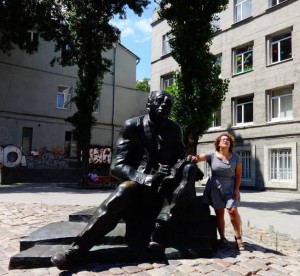Author Archives: Talia Lavin
July 17, 2014 by Talia Lavin
In Wartime, a Surreal Modesty Contest

PICTURED: The #1 existential threat to Israel’s safety.
Political pundits of the world, pay attention: while you’ve been trying to make sense of the bloody conflict in Israel and Gaza, an unidentified group of women in Crown Heights, Brooklyn, has identified its cause—and laid out a solution.
Or, as the web page blares in all-caps: “AS WAR RAGES IN THE HOLY LAND… IS THERE ANYTHING ELSE WE CAN DO TO HELP OUR BROTHERS IN THEIR TIME OF NEED?”
Project EDEN (standing for, bizarrely, “Eat ice cream, while helping Defend Eretz Yisrael Now) is a local initiative with grandiose goals: inspired by “talks of the Rebbe,” the Chabad-affiliated project aims to single-handedly “influence the safety of the Yidden [Jews] in Eretz Yisrael [the Land of Israel]” and provide “sure-fire protection.”
So how, exactly, do these dairy-product enthusiasts plan to hold Hamas missiles at bay from faraway Brooklyn?
By policing women’s bodies, of course.
The unidentified brain trust has begun a “Tznius [modesty] campaign for girls” – and don’t worry, it has “great prize incentives, in the merit of the safety of Israel.”
“Every girl who comes to day camp dressed in Tznius attire (i.e. clothing which keep necklines, elbows, knees and feet covered at all times) will receive an EDEN card,” according to COLLive.com, a Chabad-affiliated community news website.
Eight EDEN cards are redeemable for ice cream and entry in a $100 raffle—and, of course, the eternal knowledge that flashing your elbows has not caused Jews to die in the Middle East.
The group is soliciting donations to spread this project to as many summer camps as possible, lest even a single prepubescent girl in Crown Heights be unaware of the lethal power of her knees, feet, and collarbones.
It’s kind of an ingenious system, once you accept the premise that female bodies are capable of such massive destruction. (No wonder governments worldwide have such a vested interest in controlling them.) It combines ice cream and summer fun with punishing modesty standards and a veritable blitzkrieg of collective guilt. One wonders, if this were implemented more widely, what the next Iron Dome defense system would look like: perhaps a series of opaque, but breathable, literal iron domes for females to wear from the moment of birth? (The dimpled elbows of toddler girls have long been underestimated in their potential for causing death.)
Clearly, as Israeli troops enter Gaza, modesty is needed as never before: not prayers, not kindness, not good deeds or mutual understanding, and certainly not carefully considered compromises from politicians in positions of power. The way to “help our brothers in their time of need,” apparently, is to suppress every inch of skin their sisters possess.
And then give them some ice cream.
- No Comments
July 9, 2014 by Talia Lavin
On Mothers, Sisters, Narrative and War
My twin sister, my little sister, and my best friend are all in Israel right now.
“Should I cancel my aliyah anniversary party Friday?” my twin just asked on Gchat. “So few people RSVPed…”
“I don’t know about the protocol for parties in the middle of a rocket war,” I answered.

Israel’s Iron Dome defense system (Wikimedia Commons)
“Don’t be melodramatic,” she said.
I have tried not to be. My younger sister, who is twenty; my twin sister and her husband, a former IDF officer and current reservist; my older sister’s husband, another former officer and current reservist; and my best friend are all in Israel, for vastly differing reasons, and there are rockets flying everywhere at cross-purposes, but I am trying not to be melodramatic.
- 2 Comments
Link Roundups, The Lilith Blog
July 2, 2014 by Talia Lavin
Your Guide to the Hobby Lobby Case and Its Crushing Consequences

Thousands of women may now face restrictions on access to contraceptives. (Wikimedia Commons)
- 1 Comment
June 18, 2014 by Talia Lavin
The Poem that Went Viral, and the Woman Behind It
Anna Binkovitz, 21, is a proficient slam poet and author of a published chapbook, The Love Hypothetic. At a national slam poetry competition in March, Anna performed a poem called “Asking For It” that addresses a refrain perpetually directed against rape victims: that by dressing provocatively, they invite sexual predation.
The poem invites viewers to “a strange world in which all of us…can only express our wants and needs through our clothing” – a dystopian, darkly comic imagining, in which nudity—during bathing, changing, or even childbirth—always signifies wanting sex.
Last week, the poem went viral—at 400,000 YouTube views and counting—after news blog Upworthy reposted a video of Binkovitz’s performance; Jezebel and the Huffington Post, among others, marked it as an important contribution to a heated cultural conversation about consent. So Lilith’s Malka Editorial Fellow, Talia Lavin, took the opportunity to have a conversation with the outspoken poet, rape survivor, and activist.
- 1 Comment
June 10, 2014 by Talia Lavin
Golem on the rise, female in the lead
Punk-klezmer fusion band Golem has been shocking and delighting audiences for 14 years. But with their latest album, ‘Tanz,’ they’ve hit it big. The album, released by Mexican label Discos Corazon, has been featured on NPR’s ‘Fresh Air’ and — as of last night — FX’s hit show ‘Louie.’ Lilith’s Talia Lavin sat down with Golem bandleader Annette Ezekiel Kogan to talk about the unique challenges a female rocker faces, and the heartfelt emotion behind Golem’s wild sound.

Golem with comedian Louis C.K. on the set of “Louie.” (Facebook)
For Annette Ezekiel Kogan, founder, vocalist and accordionist for the punk klezmer band Golem, being the female bandleader of an all-male band is a complicated balancing act. “I feel like I go in between worlds – I’m the sexy singer, and then I’m conducting, running the show. I’m the band mother to all the guys.”
- No Comments
May 7, 2014 by Talia Lavin
A Personal Lens on the News from Ukraine
On May 2nd the southern Ukrainian city of Odessa saw its first major outbreak of violence since the turmoil in Ukraine began a few months ago. A Ukrainian-unity rally led to clashes between pro-Ukrainian protesters and pro-Russian separatists, and several hours of street violence ensued. The two sides hurled cobblestones, bricks and Molotov cocktails at one another. A raging fire that ignited the city’s Trade Union Building killed 31 people. Bloodied bodies lay in the city center, on Kulikovo Street.
Odessa, which sits on the lip of the Black Sea, has long held a unique place in the hearts and minds of those who inhabit, or study, the Former Soviet Union. From its founding in 1794, the city’s thriving role in commercial trade attracted a cosmopolitan and multiethnic populace. The city became famous, in the nineteenth and early twentieth centuries, for its humor, earthiness, and vibrant commercial endeavors—both legal and illegal. Due to Catherine the Great’s liberal policies towards Jews in the city, Odessa also attracted a massive—and largely secular—Jewish population. Its reputation for secularism led rabbis of the time to state that the fires of hell burned around Odessa. Poetry and prose in Hebrew, Russian and Yiddish shot out from Odessa’s many presses at the start of the 20th century, penned by the likes of Bialik and Babel; dubbed “The Gate to Zion” in the nineteen-teens, the city was a hotbed of Zionist idealism.

The author with a statue of Isaac Babel in Odessa. (Talia Lavin)
I first visited Odessa in the summer of 2011, working as a volunteer tour guide in the city’s cramped but charming Jewish museum. Pursuing the ghosts of literary men I studied and loved, I walked alone through cobbled streets lined with lindens, practiced my fledgling Russian and swam in the Black Sea off Odessa’s shining cliff-lined beaches. Cafes and bars in the central streets were filled at all hours with revelers drinking sweet Crimean wine.
- No Comments
 Please wait...
Please wait...